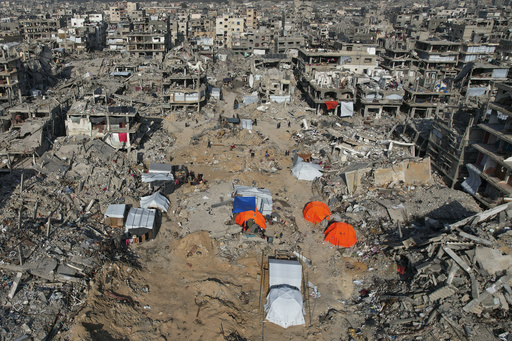In Israel, citizens have recently organized protests to commemorate 500 days of conflict in Gaza, calling for significant advancements toward a ceasefire that would allow the retrieval of all remaining hostages. Demonstrations took place in major cities such as Tel Aviv and Jerusalem, with the current ceasefire phase nearing its two-week conclusion. Discussions about the more challenging subsequent phase have yet to commence, and reports indicate that over 70 hostages still remain in Gaza, with approximately half believed to have lost their lives.
Ayelet Samerano, the mother of Yonatan Samerano—one of the victims killed in the Hamas-led assault that triggered the conflict—voiced her anguish, stating, “I want my son. My son is not part of politics.” Meanwhile, the humanitarian situation for more than two million Palestinians living in Gaza remains precarious, further complicated by Israel’s apparent alignment with a proposal from former U.S. President Donald Trump that suggests relocating Palestinians from the war-torn area, a move that Trump asserts would prevent their return.
This situation has incited significant backlash throughout the region, with U.S. Secretary of State Marco Rubio expected to hear various perspectives during his visit to the Middle East, which includes stops in Saudi Arabia and the UAE. He had a meeting with Israel’s Prime Minister recently, discussing these pressing matters.
Egypt has proposed a counter-strategy aimed at rehabilitating Gaza while keeping its Palestinian residents in place. The imminent question remains whether hostilities will resume when the initial ceasefire phase concludes in early March.
In a recent development, Israel’s Defense Ministry announced plans to establish a government department to facilitate what they refer to as the “voluntary departure of Gaza residents.” This plan is seen as a further endorsement of Trump’s controversial proposal concerning Palestinian relocation, igniting outrage both among Palestinians and across the Middle East. Despite claims of voluntary relocation, international legal experts warn that, if enacted, the proposal could constitute a war crime.
According to Defense Minister Israel Katz’s office, the initiative will offer substantial support for any Gaza resident wishing to leave for another country, including special arrangements for their departure by land, sea, and air.
In another development, the wife of an Israeli hostage recently expressed hope as she received confirmation of her husband’s survival after more than a year without any news. Sharon Alony Cunio told channel 13 that hostages freed in the ongoing ceasefire reported that her husband, David Cunio, is alive, giving her renewed strength amidst ongoing uncertainty.
David Cunio is not among the list of 33 Israeli hostages set for release in the present ceasefire phase, with negotiations for further hostage releases still pending as substantive discussions have yet to begin.
Meanwhile, Secretary of State Rubio held discussions with Saudi Crown Prince Mohammed bin Salman to emphasize the need for a consensus on a post-conflict strategy for Gaza. This trip marks Rubio’s initial visit to the Middle East since taking office, during which he aims to encourage regional leadership to devise alternatives to Trump’s relocation plan. However, outcomes from the meeting did not specifically address Trump’s proposal.
As protests continue in Israel over the drawn-out conflict, one recently freed hostage poignantly addressed a rally, emphasizing the urgent need for the remaining hostages’ return due to the diminishing time they have.
Additionally, in the legal arena, an Israeli court has agreed to yet another request from Prime Minister Benjamin Netanyahu to postpone his testimony in an ongoing criminal trial, citing security concerns. As the first sitting Israeli prime minister to testify as a defendant, Netanyahu faces allegations of fraud and bribery in multiple cases.
In Lebanon, the government has prolonged a ban on flights to and from Iran with directives for security agencies to oversee access to the only international airport. Hezbollah leader Naim Kassem has condemned Israel’s warnings against Iranian flights, as travelers remain stranded in Iran.
On the military front, an Israeli spokesperson reiterated the need for a careful and deliberate withdrawal from Lebanon while noting strategic positions where Israeli troops will remain following the ceasefire accord with Hezbollah.
In a related military incident, Israel claims to have targeted and killed Hamas’s commander of military operations in southern Lebanon during a drone strike. The military asserts that the commander was involved in planning terror attacks against Israel, a claim confirmed by Hamas.




